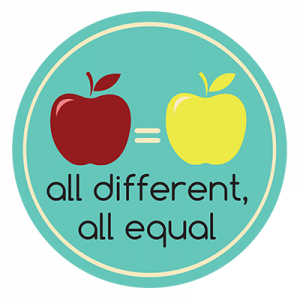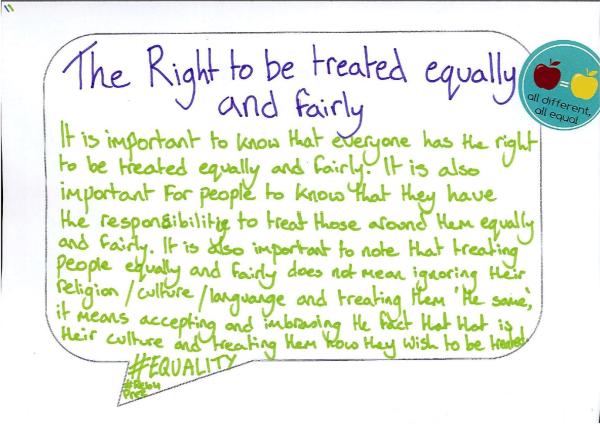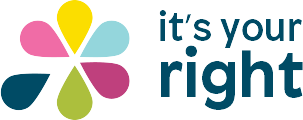You are here:
All different all equal
What does this mean?

All children have the right to be treated equally and fairly.
All children have rights: no matter who they are, where they live, what their parents do, what language they speak, what their religion is, whether they are a boy or a girl, what their culture is, whether they have a disability, whether they are gay or straight, whether they are rich or poor.
There are laws in Ireland to make sure you are not discriminated against.
EXAMPLE: The majority of schools can no longer give places to attend school based on what religion you are.

Learn more about this right
Do I have this right in Ireland?
- Under the Equal Status Act 2000 in Ireland, it’s your right to be treated equally. You can’t be treated differently and discriminated against on the following grounds: gender, civil status (married/single/civil partnership), family status, age, religion, disability, sexual orientation, race/ethnic background/nationality, membership of the Traveller community.
- Under the Schools Admission Act 2018, it’s your right to that most schools in Ireland can’t refuse to let you attend their school, as long as there is space, based on your religion or if you have no religion.
- Under the Irish Constitution, one of your fundamental rights is to be treated fairly and equally in front of the law.
Doing a project?
- There are situations where the law allows people to be treated differently. For example, primary and secondary schools may be for boys only or girls only.
- Immigrant children, traveller, LGBTI children and children with a disability are some groups in Ireland that can face difficulties in being treated equally.
- On 1 March 2017, Travellers were formally recognised for the first time as a distinct ethnic group in Ireland. This means by law they can’t be treated unfairly because they are Travellers.
- In 2016, the UN Committee on the Rights of the Child said Ireland should do more to protect the rights of children with disabilities, especially in education.
- If you would like to report a racist incident in Ireland, you can report it to iReport which is run by ENAR (European Network against Racism) or you can call the Immigrant Council of Ireland to report it to them.
- The UN’s Sustainable Development Goals include a commitment to end all forms of discrimination against girls and women by 2030.
- The Department of Children and Youth Affairs launched the first ever LGBTI + National Youth Strategy 2018 – 2020– the strategy makes a commitment by the Government of Ireland to continue to strive for the full inclusion of LGBTI+ people in Irish society and to build a more inclusive Ireland.
Links to other organisations
- IHREC The Irish Human Rights and Equality Commission (IHREC) protects and promotes human rights and equality in Ireland. You can find out more about what ‘equality’ means here.
- Belong To – BeLong To works with and supports LGBT young people in Ireland
- Pavee Point – Learn more about Irish Travellers and Roma from Pavee Point Traveller and Roma Centre
- ‘ethnicity’ – Find out more about what ‘ethnicity’ is and what it means for Travellers to be an ethnic group
- The Shona Project – A survival handbook for girls.
- The Red Card – Show Racism the Red Card works to combat racism through sport
- UNICEF – Find out from UNICEF how children with disabilities can face discrimination in different parts of the world
- Young Voices– How can young people be included more in society? Find out what young people have to say
- Migrant Rights Centre – Migrants Rights Centre work for justice, empowerment and equality for migrant workers


